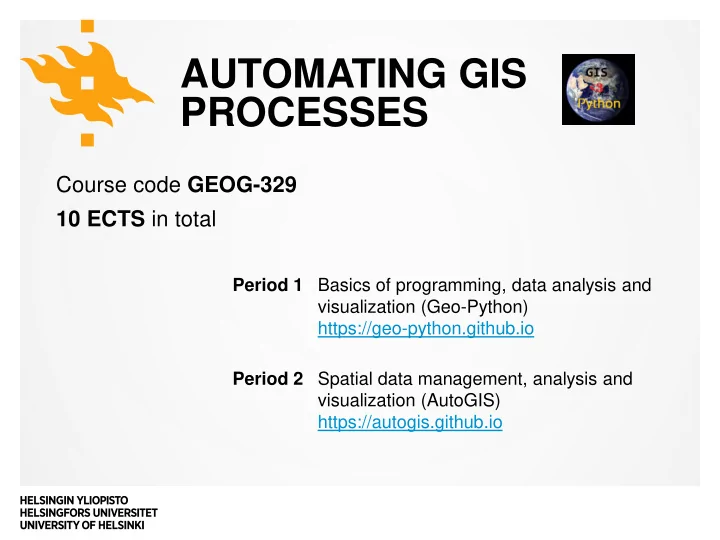

AUTOMATING GIS PROCESSES Course code GEOG-329 10 ECTS in total Period 1 Basics of programming, data analysis and visualization (Geo-Python) https://geo-python.github.io Period 2 Spatial data management, analysis and visualization (AutoGIS) https://autogis.github.io
AUTOGIS-TEAM 2019 Sara Todorović Sakari Sarjakoski Vuokko Heikinheimo Henrikki Tenkanen
OVERVIEW During the Automating GIS processes course, the students learn to analyze geospatial data efficiently and systematically using the Python programming language. The students learn the basic programming concepts and skills in Python, and learn to apply these skills to solving geographical questions , building upon their previous knowledge about Geographical Information Systems (GIS). In addition to spatial analysis skills, the students learn to use a version control system (git) and online repositories (GitHub) for documenting and communicating their analysis workflow . The course consists of interactive lectures, weekly programming exercises and a final project.
LEARNING GOALS • After completing this course, the students are able to • test and produce modular code in the python programming language • manage spatial data programmatically (for example, reading different data formats, re-projecting, re-classifying and storing data), • apply spatial analysis methods in python (such as buffering, network analysis and spatial joins) • create visualizations (graphs and maps) from geographic data using python • design and implement a geographical data analysis workflow
GENERIC SKILLS • After completing this course, the students are able to • Independently search for information regarding programming methods • Apply new methods based on online documentation • Critically evaluate the available methods and information sources • Understand the importance of version control for practical tasks and scientific purposes • Communicate their analysis workflow in written format • Complete assignments on time
COURSE MATERIALS Lessons https://autogis.github.io Exercises https://github.com/autogis-2019 Slack: https://geopython2019.slack.com new channels: #autogis-week* CSC notebooks: https://notebooks.csc.fi/ AutoGIS 2019
COURSE TOPICS 1 Shapely and geometric objects (points, lines and polygons) Managing spatial data with Geopandas (reading and writing 2 data, projections, table joins) 3 Geocoding and spatial queries 4 Reclassifying data, overlay analysis 5 Visualization: static and interactive maps 6 OpenStreetMap data (osmnx) and Network analysis (networkx) 7 Raster processing (rasterio), Python in QGIS demo
GIS IN PYTHON? Examples
GLOBAL SPECIES RANGE DATA PROCESSING Fig. 1 Vulnerability of global conservation priority areas to unsustainable commercial harvesting. Di Minin, E, Brooks, T, Toivonen, T, Butchart, S, Heikinheimo, V, Watson, J, Burgess, N, Challender, D, Goettsch, B, Jenkins, R & Moilanen, A 2019, 'Identifying global centers of unsustainable commercial harvesting of species', Science Advances , Vol 5, Nro 4, 2879. https://doi.org/10.1126/sciadv.aau2879
Di Minin et al. 2019. Fig. S1. Flowchart of the analysis.
Data from IUCN Red list Pre-processing in Python: • Subsetting • Rasterizing • ” Upscaling ” Done using arcpy, see for example: Arcpy.PolygonToRaster_conversion() Python 2.7.8 and arcpy
SCHOOL DISTRICT OPTIMIZATION MSc Thesis, Hertta Sydänlammi, 2019 “an optimization model that minimizes the variance of social variables between school districts by iteratively redrawing the districts’ borders.” Thesis: https://helda.helsinki.fi/handle /10138/302229 Code: https://github.com/herttale/Sc hool-district-optimization https://www.hs.fi/kaupunki/art-2000006275047.html
MODELING CROSS-BORDER MOBILITY USING TWITTER MSc Thesis, Samuli Massinen, 2019 Thesis: (soon available at) https://ethesis.helsinki.fi/ https://github.com/DigitalGeog Code: raphyLab/cross-border- mobility-twitter Cross-border movements in 2010-2018 between Luxembourg and surrounding areas.
PYTHON IN QGIS GeoCubes plugin: https://github.com/geoportti/GeoCube Python console in QGIS s-Finland-QGIS-Plugin
LET’S GET STARTED ! https://autogis.github.io
Recommend
More recommend